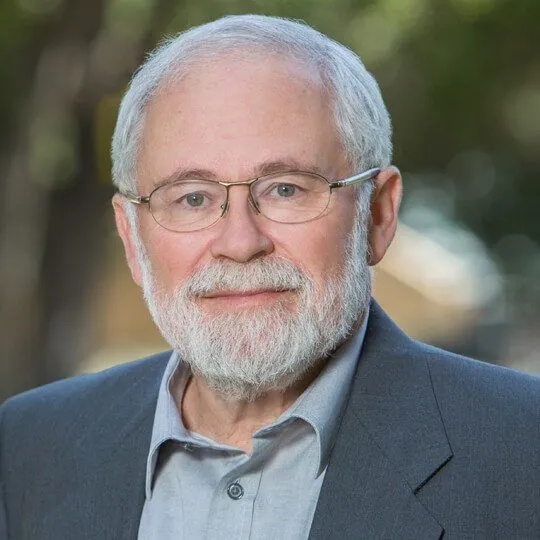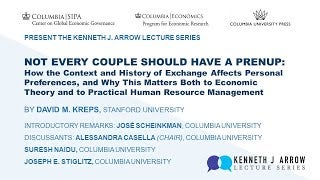
Bio
David Kreps joined the faculty of the Graduate School of Business in 1975, after completing a PhD in Operations Research in the Stanford School of Engineering. He has been a full professor since 1980, and today is the Adams Distinguished Professor of Management, Emeritus. From 2000 to 2009, he served as Senior Associate Dean.
Professor Kreps has been recognized for his research as a Fellow of the Econometric Society, a Fellow of the American Academy of Arts and Sciences, a member of the National Academy of Sciences, a Guggenheim Foundation Fellowship, and with an honorary doctorate from Universite Paris IX. In 1989, he was awarded the John Bates Clark Medal by the American Economic Association. In 2007, he received the CME Group/MSRI Prize in Innovative Quantitative Applications. In 2010 he was elected a Distinguished Fellow of the American Economic Association. In 2018 he was awarded the Carty Prize for the Advancement of Science by the National Academy of Sciences and was named the Erwin Plein Nemmers Prizewinner by Northwestern University. His 1989 Clarendon Lectures, Game Theory and Economic Modelling, have been translated into at least eight languages.
Professor Kreps has taught MBA and doctoral level courses in decision theory, stochastic processes, microeconomics, statistics, operations, competitive strategy, game theory, and human resource management. He is the author or coauthor of six textbooks. In 1991, he was awarded the MBA Distinguished Teaching Award and in 2019 he won the MSx Teaching Excellence Award. In 2010 he was awarded the Robert T. Davis Faculty Award for his overall service to Stanford GSB.
Away from work, Professor Kreps enjoys cooking and coaching youth sports. His three children think he has a lame sense of humor, of which this sentence is probably a good example.
Research Interests
- Dynamic choice
- Human resource management
- Behavioral economics
- Economic equilibrium in dynamic-choice contexts
Academic Degrees
- MA and PhD, Stanford University, 1975
- AB, Dartmouth College, 1972
Academic Appointments
- Stanford GSB: Professor Emeritus, 2018-present; Professor, 1980-2018; Senior Associate Dean, 2000-09; Associate Professor, 1978-80; Assistant Professor, 1975-78
- Tel-Aviv University, Berglas School of Economics, Sackler Fellow, 1991-2006
- Visitor: Bocconi University 1992; St. Catherine's College Oxford 1990; CORE 1990; Tel-Aviv University 1989-90; Universite Paris IX 1986; Hebrew University 1985; Harvard University 1983; Cowles Foundation 1982; Churchill College Cambridge 1978-79
Awards and Honors
- MSx Teaching Excellence Award, 2019
- The Erwin Plein Nemmers Prize in Economics, Northwestern University, 2018
- John J. Carty Award for the Advancement of Science, National Academy of Sciences, 2018
- Robert T. Davis Faculty Award, 2010
- Distinguished Fellow, American Economic Association, 2010
- MSRI Prize in Innovative Quantitative Applications, CME Group, 2007
- Doctorate Honoris Causa, Université Paris IX, 2001
- John Bates Clark Medal, American Economic Association, 1989
- Distinguished Teaching Award, MBA, 1991
- Guggenheim Foundation Fellow, 1989-90
- Sloan Foundation Fellow, 1983-85
Service to the Profession
Member
- U.S. National Academy of Sciences, 1997-present
Fellow
- American Academy of Arts and Sciences, 1993-present
- Econometric Society, 1983-present
Co-Editor
- Econometrica, 1984-88
Program Co-Chair
- Seventh World Congress of the Econometric Society, 1995
Research Statement
Journal Articles
Other Publications
Books
Book Chapters
Degree Courses
Non-Degree Courses
Programs and Non-Degree Courses
Insights by Stanford Business
School News
Videos and Podcasts
-
The Kenneth Arrow Lecture at Columbia University, December 13, 2021
David M. Kreps delivered The 13th Annual Kenneth J. Arrow Lecture, entitled “Not Every Couple Should Have a Prenup: How the Context and History of Exchange Affects Personal Preferences, and Why This Matters Both to Economic Theory and to Practical Human Resource Management.”
-
David M. Kreps delivered The Erwin Plein Nemmers Lecture, entitled “Some Dimensions of Behavior with which Economics Should Contend.”
